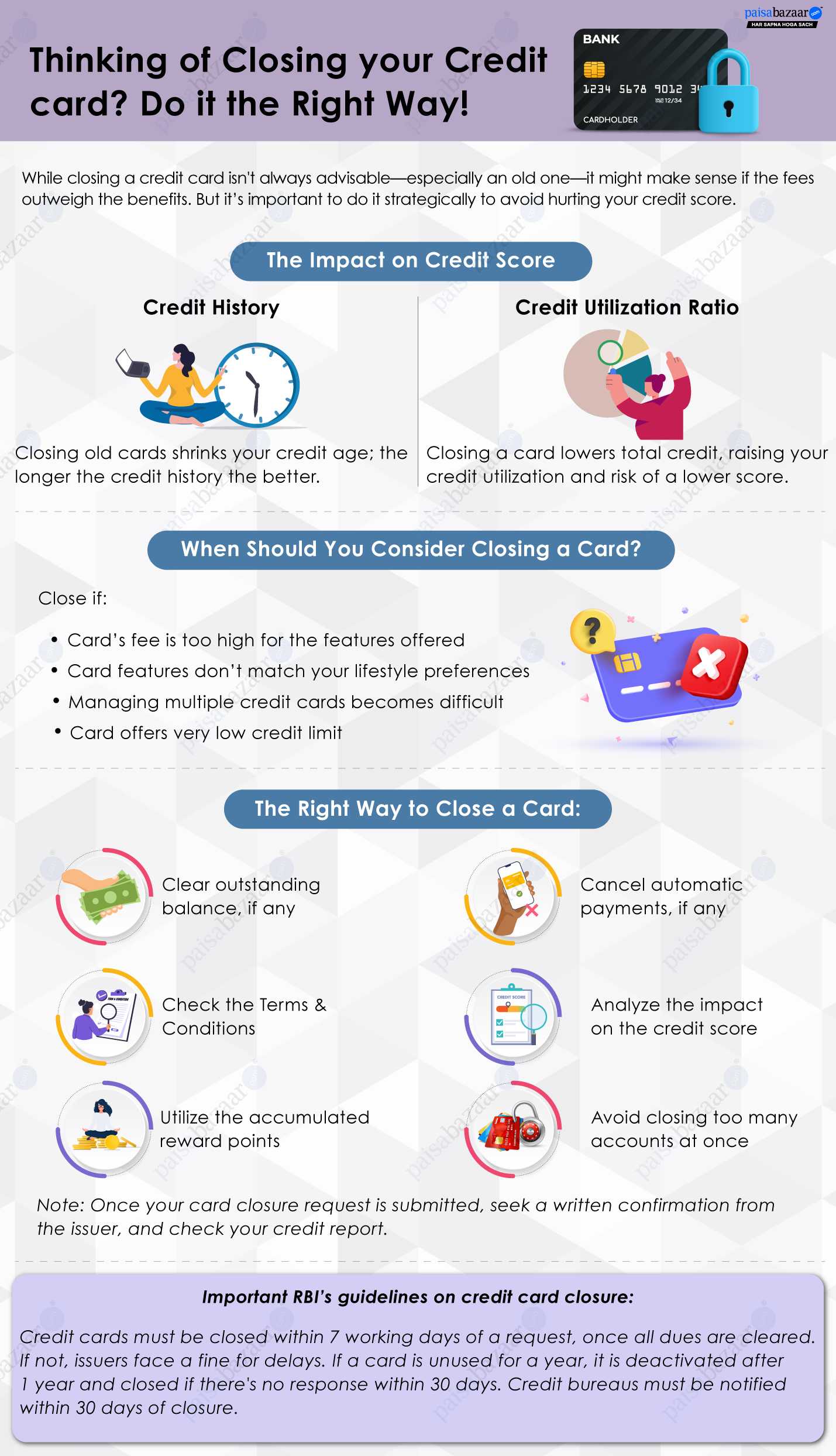Paisabazaar app Today!
Get instant access to loans, credit cards, and financial tools — all in one place
Our Advisors are available 7 days a week, 9:30 am - 6:30 pm to assist you with the best offers or help resolve any queries.
 Get the App
Get the App

Get instant access to loans, credit cards, and financial tools — all in one place

Scan to download on

If you own multiple credit cards, the thought of closing the unused ones must have crossed your mind. Though the option sounds practical, it is not always wise to close an old credit card account. The number of credit cards you own has direct impact on your credit report with the total credit limit across cards affecting your credit utilization ratio and the oldest cards adding to your credit history. Thus, it is advisable to leave unused credit cards open, as cancelling a credit card may hurt your credit score.
However, this does not mean that you should never cancel your cards. Credit card closure could be a smart move if the annual fee outweighs its benefits, especially if the card charges a significantly high annual fee.
On this page, we cover important details about credit card closure, including the impact on credit score, when you should opt for a closure, when to avoid it, and the right way to do it.

Unused credit cards largely impact your credit age and CUR (credit utilization ratio) and closing them can:
While determining your credit history, the credit bureaus not only consider your oldest and the newest credit card or loan accounts but also the average age of all your other loan accounts combined. A longer credit history is usually preferred, as the lenders would be more willing to lend to a person who knows the rules of the credit market than to someone new to credit. So, closing the older unused credit card accounts can decrease the length of your credit history and even lower your credit score.
Tip: If you have owned a credit card for quite some time, say two to three years, closing it may not be a wise decision. However, if you have had the card for just a few months, closing it would not have a significant impact on your credit score.
A CUR is a ratio of the utilized credit to the total available credit from all your loan accounts, along with the individual credit utilization on different credit cards. In general, it is advised to maintain a low CUR to indicate lower dependency on credit. Here, unused credit cards add up to your total credit, helping you maintain a low CUR. On the other hand, closing any of your credit cards can lower the total available credit, thus increasing this ratio.
Illustration: How Rahul’s credit card closure led to a lower CUR
Rahul, a 30-year-old software engineer with a credit score of 756, owned three credit cards with the following limits as of Dec 2024:
In January 2025, Rahul closed his Credit Card 1 as he rarely used it but had to pay a hefty annual fee. The total debts on Rahul amounted to Rs. 110,000. Basis this:
| Total Credit Limit | Total Debt | Credit Utilization Ratio | |
| Before closing Credit Card 1 | Rs. 4,30,000 | Rs. 1,10,000 | 25.58% |
| After closing Credit Card 1 | Rs. 2,15,000 | Rs. 1,10,000 | 51.16% |
2 months later, in March 2025, closing credit card 1 and continued usage on other cards made Rahul’s credit utilization ratio shoot up, leading to a decline in his credit score by 20 points, from 756 to 736.
Tip: If you have closed a credit card and the total available limit has reduced, try limiting your card usage for a few months to maintain a stable credit score, as that way the CUR is least impacted.
Though it is generally advised not to close your credit card, there are a few situations under which it might make more sense to discontinue a card, such as:
After analyzing all the pros and cons of closing a credit card, if you have decided to go for a closure, there are a few things to keep in mind to ensure closing it the right way:
On a concluding note, understand that though closing a credit card is not recommended, when done strategically, it may not come as a regret. Before closure, do not just stop using a credit card completely and focus on maximizing the rewards and benefits. Take a closer look at its pros and cons, the types of benefits that it offers, and how much harm could be done to your credit score if you close it. The decision will vary as per your credit age and debt utilization. Thus, it is better to analyze your credit profile and make a thoughtful decision.